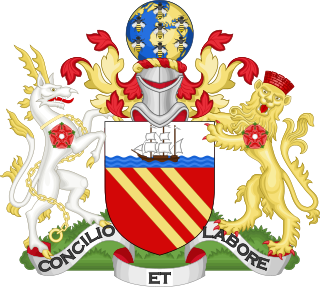
Manchester City Council is the local authority for Manchester, a city and metropolitan borough in Greater Manchester, England. Manchester is the sixth largest city in England by population. Its city council is composed of 96 councillors, three for each of the 32 electoral wards of Manchester. The council is controlled by the Labour Party and led by Bev Craig. There is currently no official opposition as the two opposition groups, the Green Party and the Liberal Democrats both have four councillors. Joanne Roney is the chief executive. Many of the council's staff are based at Manchester Town Hall.

The 2002 St Helens Metropolitan Borough Council election took place on 2 May 2002 to elect members of St Helens Metropolitan Borough Council in Merseyside, England. One third of the council was up for election and the Labour Party stayed in overall control of the council.

Salford was, from 1844 to 1974, a local government district in the county of Lancashire in the northwest of England, covering the city of Salford. It was granted city status in 1926.
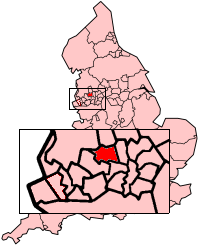
The 1998 Bolton Metropolitan Borough Council election took place on 7 May 1998 to elect members of Bolton Metropolitan Borough Council in Greater Manchester, England. One third of the council was up for election and the Labour Party kept overall control of the council.

Sale was, from 1867 to 1974, a district in Cheshire, England. The district had in turn the status of local government district, urban district and municipal borough. Its area now forms part of the Metropolitan Borough of Trafford, Greater Manchester.

The Liberal Democrats are a liberal political party in the United Kingdom, founded in 1988. They have been the third-largest UK political party by the number of votes cast since the 1992 general election, with the exception of the 2015 general election. They have 15 members of Parliament in the House of Commons, 84 members of the House of Lords, four Members of the Scottish Parliament and one member in the Welsh Senedd. The party has over 3000 local council seats, the third largest of the British political parties. The party holds a twice-per-year Liberal Democrat Conference, at which party policy is formulated. In contrast to its main opponents' conference rules, the Lib Dems grant all members attending its Conference the right to speak in debates and vote on party policy, under a one member, one vote system. The party also allows its members to vote online for its policies and in the election of a new leader. The party served as the junior party in a coalition government with the Conservative Party between 2010 and 2015; with Scottish Labour in the Scottish Executive from 1999 to 2007; and with Welsh Labour in the Welsh Government from 2000 to 2003 and from 2016 to 2021.

The 2002 Hull City Council election took place on 2 May 2002 to elect members of Hull City Council in England. The whole council was up for election with boundary changes since the last election in 2000 reducing the number of seats by 1. The Labour Party lost overall control of the council to no overall control.
The 2000 Oldham Council election took place on 4 May 2000 to elect members of Oldham Metropolitan Borough Council in Greater Manchester, England. One third of the council was up for election and the Liberal Democrats gained overall control of the council from the Labour Party.
The 1908 Manchester North West by-election was a Parliamentary by-election held on 24 April 1908. The constituency returned one Member of Parliament (MP) to the House of Commons of the United Kingdom, elected by the first past the post voting system.

Michael Joseph Patrick Kane is a British politician who has served as Member of Parliament (MP) for Wythenshawe and Sale East since 2014. He is a member of the Labour Party.
An election to the County Council of London took place on 31 March 1955. The council was elected by First Past the Post with each elector having three votes in the three-member seats. The Conservative Party made significant gains, but the Labour Party retained a substantial majority.
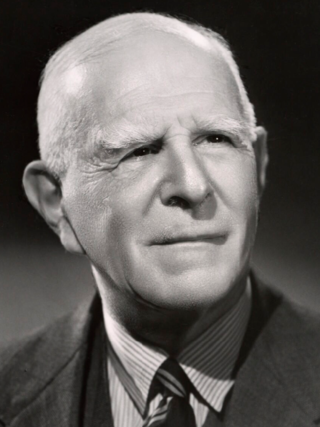
An election to the County Council of London took place on 7 March 1946. The council was elected by First Past the Post with each elector having two votes in the two-member seats. The Labour Party once more made gains, again increasing their majority over the Conservative Party.
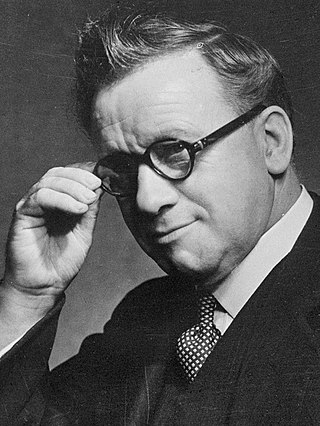
An election to the County Council of London took place on 4 March 1937. The council was elected by First Past the Post with each elector having two votes in the two-member seats. The Labour Party made gains, increasing their majority over the Municipal Reform Party.

An election to the County Council of London took place on 8 March 1934. The council was elected by First Past the Post with each elector having two votes in the two-member seats. The Labour Party made large gains from the Municipal Reform Party, and for the first time won control of the council..

An election to the County Council of London took place on 5 March 1931. The council was elected by First Past the Post with each elector having two votes in the two-member seats. The Municipal Reform Party slightly increased its majority on the council, with overall results matching those from 1925.

An election to the County Council of London took place on 8 March 1928. The council was elected by First Past the Post with each elector having two votes in the two-member seats. The Labour Party made slight gains at the expense of the Municipal Reform Party, which nonetheless retained a substantial majority.

Andrew Howard Western is a British politician of the Labour Party who was elected as Member of Parliament (MP) for Stretford and Urmston at the 2022 by-election. He had been the leader of Trafford Council since 2018, a post he vacated upon his election to parliament.

Elections to Sale Council were held on Thursday, 11 May 1961. One third of the councillors were up for election, with each successful candidate to serve a three-year term of office. The Conservative Party retained overall control of the council.

Elections to Sale Council were held on Thursday, 9 May 1963. One third of the councillors were up for election, with each successful candidate to serve a three-year term of office. The council remained under no overall control.
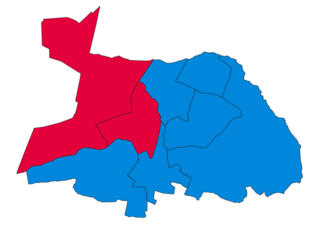
Elections to Altrincham Council were held on Thursday, 12 May 1955. One third of the councillors were up for election, with each successful candidate to serve a three-year term of office. The Conservative Party retained overall control of the council.















